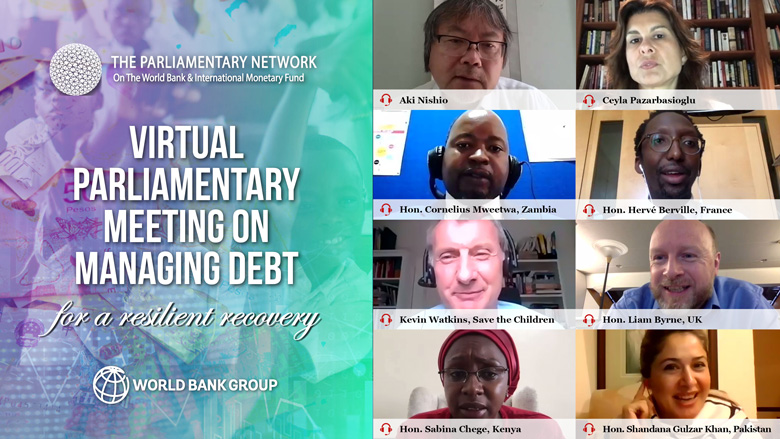A Virtual Parliamentary Meeting on Managing Debt for a Resilient Recovery, co-organized by the World Bank and the Parliamentary Network on the World Bank and IMF on July 9, 2020, connected some 100 registered participants from every region of the world to discuss solutions to the looming threat of debt distress facing many countries due to the COVID-19 pandemic.
Public debt in developing nations is spiking to levels unseen in 50 years, threatening to plunge poorer countries into a debt crisis. Many policymakers are concerned about how to manage funds while simultaneously mitigating the devastating effects of the virus, thinking ahead about rebuilding better, and meeting previous commitments such as the SDGs. This virtual parliamentary meeting was an occasion for them to gain a deeper understanding of the current context with a dynamic array of speakers from the World Bank Group, the Parliamentary Network, and civil society. Participants engaged in dialogue on policy recommendations and best practices for enhanced budgeting and oversight to survive the COVID-19 crisis and recover in a sustainable manner for stronger development outcomes.
Ceyla Pazarbasioglu, Vice President, Equitable Growth, Finance & Institutions, World Bank Group set the stage with the current global economic and debt setting as the COVID-19 pandemic ravages lives and livelihoods. She shared findings from the latest Global Economic Prospects report that the global economy will see its deepest recession since the Second World War. It is expected to push up to 100 million people into extreme poverty, erasing decades of progress in poverty reduction.
While COVID has been a huge shock to the global economy, Ms. Pazarbasioglu noted that it is also an opportunity to do things previously politically not possible, working together to emerge from this sooner and stronger. She shared the broad, fast action of the World Bank Group to support developing countries in this unprecedented situation. To address the health, social and economic effects of the pandemic, the World Bank Group is providing $160 billion in emergency financing by June 2021 and is implementing the Debt Service Suspension Initiative (DSSI), which suspends debt service payments from May through December 2020 for up to 73 International Development Association (IDA) and UN Least Developed Countries (LDC), allowing them to concentrate on fighting the crisis.
Aki Nishio, Vice President, Development Finance, World Bank Group elaborated on the Bank’s support to the poorest IDA countries through $50 billion in grants and zero-interest financing and $11 in new commitments for every $1 of debt service paid during the next year. He also introduced the new Sustainable Development Finance Policy (SDFP) which enhances incentives for countries to move toward sustainable financing and promotes stronger collective action and coordination on sustainable lending practices among borrowers, creditors and international development partners. He emphasized the importance of Members of Parliament who play a crucial role in overcoming this crisis in a fiscally sustainable manner through policies, reforms and oversight of government spending.
Kevin Watkins, Chief Executive, Save the Children supported the World Bank Group’s debt initiatives and encouraged parliamentarians to focus on the younger generations who will be those most deeply affected by the immediate and long-term effects of COVID-19. “It’s incumbent on all of us to make this issue a human issue. We should be making the case for converting government debt liabilities into investment assets, human capital assets. There’s no better way of doing that than in investing in children.”
The Rt. Hon. Liam Byrne MP and Chair of the Parliamentary Network on the World Bank and IMF; Chair of the APPG on Inclusive Growth, UK initiated the parliamentary perspective by noting three priorities: easing transitions such as decarbonization and digitalization; consolidating debt to avoid increased interest rates; and tax reforms on carbon taxes, wealth tax, and regulation of overseas tax havens. He was followed by three influential MPs from countries at high-risk of debt distress who shared their country perspectives on managing debt and collaborating with the World Bank: Sabina Chege MP and Chair of the Health Committee, Kenya; Shandana Gulzar Khan MP, Pakistan and Chairperson of Commonwealth Women Parliamentarians; and Cornelius Mweetwa MP and Member of the Public Accounts Committee, Zambia.
The parliamentary discussion was moderated by Hon. Hervé Berville MP and Member of the Foreign Affairs Committee, France, an author of a major report on the modernization of overseas development aid. Parliamentarians underscored the need for more involvement in budgeting and the approval of World Bank financing so they could help allocate it meaningfully to the most vulnerable communities. This could also strengthen their oversight role for increased transparency, making it a win-win for all parties involved.
Key takeaways included:
- The World Bank is seen as a fast-acting, transparent organization, both in its approach to supporting the COVID-19 response in the poorest countries, as well as in responding to requests from parliamentarians for more information regarding its stance on debt management.
- Parliamentarians called for increased involvement in the World Bank loan approval process and the shaping of projects to help target the needs of the most vulnerable populations.
- Debt service suspension and relief should be expanded beyond bilateral debt from G20 and Paris Club lenders to loans from private and Chinese creditors, which account for a larger proportion of global debt.
- The COVID-19 pandemic has underscored the need for greater investments in the quality of health and education services to improve human capital outcomes and prepare youth for the jobs of the future.

